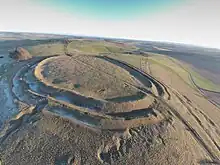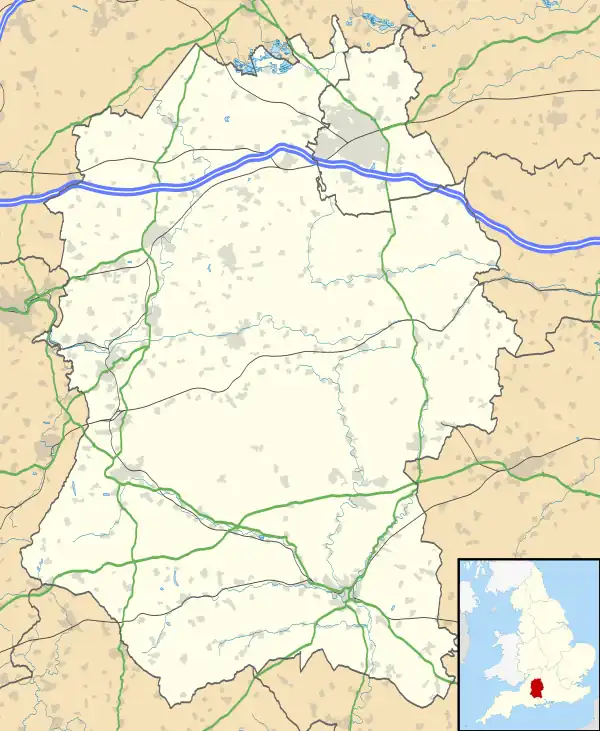 Aerial view of Barbury Castle | |
 Shown within Wiltshire | |
| Location | Wiltshire |
|---|---|
| Coordinates | 51°29′07″N 1°47′11″W / 51.4853°N 1.7865°W |
| Type | Hillfort |
| Area | 12 acres (4.9 ha) |
| History | |
| Periods | Iron Age |
| Site notes | |
| Public access | yes, The Ridgeway |
| Official name | Barbury Castle: a hillfort and bowl barrow |
| Designated | 18 August 1882 |
| Reference no. | 1014557 |
Barbury Castle is a scheduled hillfort in Wiltshire, England.[1] It is one of several such forts found along the ancient Ridgeway route. The site, which lies within the Wessex Downs Area of Outstanding Natural Beauty, has been managed as a country park by Swindon Borough Council since 1971. It is on Barbury Hill, a local vantage point, which, under ideal weather conditions, commands a view across to the Cotswolds and the River Severn. It has two deep defensive ditches and ramparts.[2]
History
The site was first occupied some 2,500 years ago, and was then in use during the Roman occupation of the area. Archaeological investigations at Barbury have shown evidence of a number of buildings, indicating a village or military garrison at this time.
In the 6th century the site became part of the Saxon kingdom of Wessex, following the defeat of the Romano-British at the Battle of Beranburgh, Beran Byrig or Beranbyrig in AD 556, the site of which is just north of the castle.[3] Centuries later the area was a favourite haunt of the 19th-century writer Richard Jefferies, who lived an hour's walk away at Coate.[2] The site was designated as a scheduled monument in 1882.[1]
In World War II the War Ministry appropriated the site for US Army Air Force anti-aircraft guns; the bases for these are apparently visible as hollows around the edge of the fort interior.[4]
In 1996, a geophysical survey revealed traces of 40 hut circles inside the castle.[4] A reconstruction of an Iron Age roundhouse was built on the site in 2006 but was destroyed by vandals in October 2008.[5]
In 2009, English Heritage (now Historic England) carried out a National Mapping Programme project which comprised an interpretation, transcription and analysis of all archaeological features visible on aerial photographs in the environs of Barbury Castle.[6]
Location
Barbury Castle is at grid reference SU149762, about 5 miles (8 km) south of Swindon and the M4, on the northern edge of the Marlborough Downs within the North Wessex Downs Area of Outstanding Natural Beauty. The site is close to the Ridgeway long-distance footpath, which runs east–west along the edge of the downs. In the surrounding area there are round barrows, Celtic field systems and 18th-19th century flint workings.[2]
Gallery
 Steep earthworks looking northwards
Steep earthworks looking northwards Aerial view from above
Aerial view from above Barbury Castle showing the scale of the present-day structure
Barbury Castle showing the scale of the present-day structure Looking westwards towards the River Severn
Looking westwards towards the River Severn The Iron Age house under construction, July 2006
The Iron Age house under construction, July 2006 Plans of the Iron Age house
Plans of the Iron Age house
See also
References
- 1 2 Historic England. "Barbury Castle: a hillfort and bowl barrow (1014557)". National Heritage List for England. Retrieved 10 January 2018.
- 1 2 3 "Leisure and sport: Barbury Castle". Swindon Borough Council. Archived from the original on 16 January 2006.
- ↑ Leeds, E.T. (1954). "The Growth of Wessex". Oxoniensia. Oxford Architectural and Historical Society. LIX: 56. Retrieved 6 October 2011.
- 1 2 The Modern Antiquarian: Barbury Castle
- ↑ "Iron Age replica goes up in flames". Swindon Advertiser. 29 October 2008. Retrieved 13 June 2022.
- ↑ "Barbury Castle Environs: Air Photo Survey and Analysis". Historic England. 9 October 2009. Retrieved 5 July 2022.
External links
![]() Media related to Barbury Castle at Wikimedia Commons
Media related to Barbury Castle at Wikimedia Commons
- Swindon Borough Council web page on Barbury Castle, archived in 2013